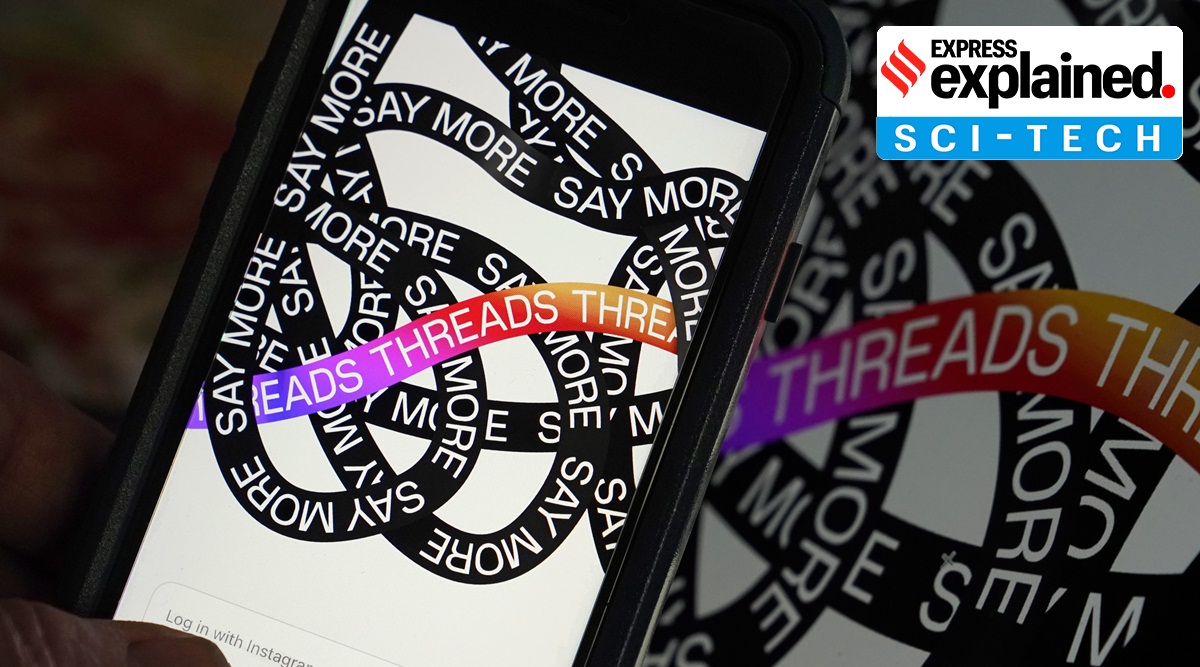Why the Threads app from Instagram is not available in Europe right now
Threads is a new app that shares many features with Twitter, which has recently faced issues of falling revenue and controversial policies. But, EU's privacy law seeks compliance from big tech companies.
 Meta unveiled the app to rival Twitter, targeting users looking for an alternative to the social media platform owned and frequently changed by Elon Musk. (AP/PTI)
Meta unveiled the app to rival Twitter, targeting users looking for an alternative to the social media platform owned and frequently changed by Elon Musk. (AP/PTI) Threads, the new social media platform launched by Instagram on Thursday (July 6), is being seen as the strongest competitor to Twitter, so far. It amassed a record 50 million users on its first day, the most for any social media platform, ever. Interestingly, this is a number which does not include a major population group – the entirety of Europe.
Why can’t people from Europe access Threads?
Threads is a new app that shares many features with Twitter, which has recently faced issues of falling revenue and controversial policies. This has prompted efforts among tech companies to find a potential replacement. While Instagram is known for being more visual in its user experience, with its most popular features being photo-based posts and short videos (called Reels), Threads will be more text-heavy.
In Europe, however, users will only see its roll-out once Meta, the parent company behind Threads, Instagram and Facebook, plans to do so. Meta spokesperson Matt Pollard told POLITICO that it has not done so “because of upcoming regulatory uncertainty.”
Simply, this means that Meta is awaiting some clarity from the European body in charge of regulating such apps. A Time Magazine report mentions that an approval is awaited from the European Commission, the European Union’s executive arm, before Meta can launch Threads in EU countries.
Why is the approval needed?
This is because of a March 2022 law, called the EU’s Digital Markets Act (DMA), passed in the EU Parliament. The law is considered one of the more heavy-duty data and privacy protection regimes in the world, brought on as concerns emerge about the ever-growing impact of social media and large tech companies (such as Amazon and Apple).
Its main aim is to limit the influence commanded by big tech companies and level the playing field for other companies, ultimately affecting the quality of experiences and choices that users have online.
For this, it has classified some platforms as “gatekeepers”. The criteria for this includes any company that has a strong economic position and is active in multiple EU countries, or one that has a large intermediate position, meaning it links a large user base to a large number of businesses.
According to a recent Reuters report, Google, Amazon, Apple, Meta Platforms and Microsoft have notified the European Commission that they qualify as gatekeepers. Samsung and TikTok owner ByteDance also said they meet the EU thresholds.
Why are ‘gatekeepers’ targeted by the DMA?
It has to do with their dominant position in the market. Take the example of Google. Most buyers of an android phone will find that their phones come with a host of apps, such as Google Maps, Gmail, etc., that cannot be uninstalled. The DMA says that ‘gatekeepers’ cannot prevent users from uninstalling any pre-installed software or app, if they wish so.
Another DMA rule says that companies must not “treat services and products offered by the gatekeeper itself more favourably in ranking than similar services or products offered by third parties on the gatekeeper’s platform.” This could include not allowing the presence of other app stores, such as those except Google Play on Android phones.
The DMA flows from the General Data Protection Regulation or GDPR, which focuses on regulations for the processing of personal data. In effect since 2018, it has been criticised for being excessively stringent, and imposing many obligations on organisations processing data.
In the EU, the right to privacy is enshrined as a fundamental right that seeks to protect an individual’s dignity and her right over the data she generates. The European Charter of Fundamental Rights recognises the right to privacy as well as the right to protection of personal data, and is backed by a comprehensive data protection framework, which applies to processing of personal data by any means, and to processing activities carried out by both the government and private entities. There are certain exemptions, such as national security, defence, public security, etc, but they are clearly defined and seen as exclusions on the periphery.
As per the DMA, fines for not following the rules could be up to 10% of the company’s total worldwide annual turnover, or up to 20% in the event of repeat violations.
Has this happened for other companies as well?
The DMA started applying as of the beginning of May 2023. “Within two months, companies providing core platform services have to notify the Commission and provide all relevant information. The Commission will then have 45 working days to adopt a decision designating a specific gatekeeper,” it says.
Gatekeepers designated as such will have six months after the Commission decision to ensure compliance with the DMA obligations.
What could be the possible privacy concern on Threads?
To use Threads, one has to already have an Instagram account. Similarly, to delete a Threads account, a user must also delete their Instagram account.
Further, its App Store listing reveals a long list of permissions that users have to grant, which include access to data on a user’s health, finances, search history, locations, identifiers (name, age, sex, etc.) and other “sensitive data”.
- 01
- 02
- 03
- 04
- 05






































